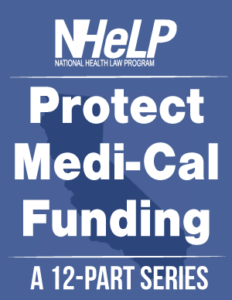 This post is part 9 of our 12-part “Protect Medi-Cal Funding” series. Medi-Cal provides a long-term investment that helps Californians succeed. This blog series highlights the importance of access to providers in Medi-Cal.
This post is part 9 of our 12-part “Protect Medi-Cal Funding” series. Medi-Cal provides a long-term investment that helps Californians succeed. This blog series highlights the importance of access to providers in Medi-Cal.
California’s Medicaid program, Medi-Cal, covers 13 million Californians—one third of the state’s residents. Medi-Cal covers a range of services to treat and support the low-income children, adults, families, seniors, pregnant women, and people with disabilities enrolled in the program. The Better Care Reconciliation Act (BCRA) under consideration by the Senate cuts federal Medicaid spending by $772 billion over ten years and caps Medicaid funds to states.These cuts are just as bad as those made by the American Health Care Act (AHCA), passed by House Republicans in May. In addition, the recently released White House budget proposes to further cut federal Medicaid spending by an estimated $1.3 trillion over the next decade. These Medicaid funding cuts will shift costs to the state, including California, which anticipates a $30 Billion cut over the next 10 years under the BCRA.
Faced with these cuts, the state may seek to:
- Cut reimbursement rates to Medi-Cal providers, causing fewer providers to participate in the program;
- Reduce capitation rates paid to Medi-Cal managed care plans, resulting in the plans’ cutting provider payment rates, or narrowing their networks;
- Enact higher out-of-pocket cost-sharing or other utilization controls to restrict or delay access to Medi-Cal services.
Cutting reimbursement rates or placing barriers on access to care will further deplete the already limited availability of Medi-Cal providers and harm low-income individuals by forcing them to forgo or delay care at risk to their own health. In addition, if access to health care providers who provide Medi-Cal services is more difficult, low-income Californians are less likely to receive preventative screenings and services that are cost-effective, and are less likely to receive necessary treatment that can stop illnesses or health conditions from worsening or spreading.
Check out our Protect Medi-Cal Series, Issue Brief #9, for a “deeper dive” on the importance of Medi-Cal to ensuring access to providers for low-income people, and how access is threatened by Medicaid funding cuts.
Published Blogs in the Series:
Why Medicaid Cuts Would Harm Health Care for California’s Children
Medi-Cal Cuts Will Harm Health Care for Women In California
Medi-Cal is Critical for Older Adults and Individuals with Disabilities
Medi-Cal Cuts Will Eliminate or Reduce Access to Necessary Services
Medicaid Cuts Would Undermine Medi-Cal’s Ability to Provide Affordable Care to Calif.’s Most Vulnerable People
Proposed Medicaid Cuts Would Endanger Calif.’s Ability to Address Health Disparities
Senate’s Effort to Gut Medicaid Threatens Calif.’s Ability to Provide Care for Women Living with HIV
Republican Policy to Slash Medicaid Funding Would Endanger Calif.’s Enrollment and Coverage Protections